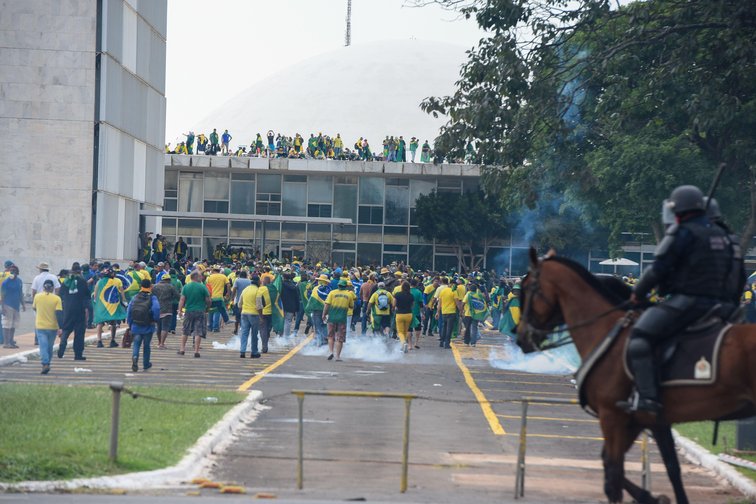Social media posts show homeschooling advocates supported far-right attempts to overturn Lula’s win against Bolsonaro
Diana Cariboni Joana Oliveira
7 February 2023,

Bolsonaro supporters stormed government buildings in an attempted coup on 8 January 2023 |
Ton Molina / Fotoarena / Sipa USA / Alamy Stock Photo
Advocates of Brazilian homeschooling organisations supported the attempted coup on 8 January that tried to topple the country’s newly elected leader Luiz Inácio Lula da Silva, openDemocracy has found.
Some engaged in or praised anti-democratic discussions after the election last October, amplified misinformation and supported calls for a military coup. Others supported online attacks against supreme court justices. Some seem to have actually participated in the insurrection. Multiple social media posts were removed and some accounts were deactivated or made private after openDemocracy contacted the relevant individuals for comment.
Soon after the election, in which former president Jair Bolsonaro was narrowly defeated by Lula, Bolsonaro supporters alleged that Lula’s victory was a fraud, perpetrated by the supreme electoral court and its head, Alexandre de Moraes, allegedly to impose a communist dictatorship. The Bolsonaristas’ solution: overturn the results and reinstate Bolsonaro as president, by military intervention if necessary.
The Brazilian authorities have found no evidence of any electoral fraud.
Pro-Bolsonaro demonstrations began in several states in November and became more violent in December. On 8 January, a week after Lula’s inauguration as president, rioters stormed the three main government buildings in the capital, Brasilia.
The homeschooling movement has risen out of the larger evangelical population within Brazil, which has long supported Bolsonaro, and has affiliations with US Christian nationalist organisations. A majority of evangelicals (68%) believe the allegation of election fraud, according to a survey released on 10 January. More than 64% also expressed support for a military coup, while 50% considered the storming of Congress justified.
openDemocracy analysed dozens of social media posts (including on Facebook, Instagram, Twitter and YouTube) from key figures in the homeschooling movement. All the social media posts mentioned below (unless linked to) are no longer available to view.
Gaba Costa and Simeduc
Gaba Costa is a high-profile homeschooling advocate in Brazil. Her company Simeduc (whose full name translates as Online Symposium on Home Education) sells the ultra-conservative Christian US homeschooling programme ‘Classical Conversations’ in Brazil. She’s also a board member of the Global Home Education Exchange, a group of international conservatives platformed by the US organisation Home School Legal Defense Association, which has a major influence on the Brazilian movement.
Posts on Costa’s personal Instagram account, and on her company’s Instagram and Facebook accounts, encouraged the protests and shared false claims of electoral fraud and support for military intervention. The Instagram accounts were made private and the Facebook posts were removed after openDemocracy contacted Costa for comment on 20 January.
On 8 January, when thousands of pro-Bolsonaro rioters invaded and rampaged through Congress, the Supreme Court and presidential palace in Brasilia, the Simeduc Instagram account posted a video from the scene of the riot, with more than 3,000 likes. One follower reacted: “Proud of you for representing me and more than 50% of the Brazilian people.” The post was removed on 18 January.
A video of Lula’s inauguration, punctured by fictional news headlines announcing corruption charges against him and his Workers’ Party, appeared on the same account, also on 8 January. “It’s unacceptable to watch all this from the sofa,” the post said. Among more than 2,000 favourable reactions from followers, only a few condemned the riots and destruction seen in Brasilia.

Screenshot of a Simeduc Instagram reel on 6 November 2022, depicting a broken-hearted avatar of Gaba Costa.
Posts on the same account from last year, before and after the election, reveal Costa’s pro-Bolsonaro leanings. On 6 November, next to a short video of a Bolsonaro demonstrator praying, an avatar of Costa with a broken heart says: “They say we are criminals.”
On 7 November, another post read: “We don’t accept a criminal government. Lula out!” Instagram labelled the post – and several others in Costa’s social media accounts – with a warning of fake electoral information.
We will not recover this nation without a civil war. It’s sad! But we need to prepare for the worstGaba Costa
Similar messages were posted on Simeduc’s Facebook page, where Costa has also expressed pro-Bolsonaro positions. The page includes pictures of Costa with the then president in Brasilia.
On 24 November, a post said: “I don’t see any chance of a peaceful resolution… If you want peace, prepare for war… I hadn’t expected a real war… But we’re running short of resources… We will not recover this nation without a civil war. It’s sad! But we need to prepare for the worst.”
Two days later, she posed for a photograph at a military facility in Río de Janeiro, repeating: “If you want peace, prepare for war.”
The day after the riots in Brasilia, another Facebook post read: “If the Supreme Court keeps acting violently against the Constitution and the Brazilian people, more Dantesque scenes will be seen across Brazil.”
Costa and other homeschooling advocates also made use of the hashtag #BrazilWasStolen. An analysis by the Digital Forensic Research Lab, which tracks online disinformation, concluded that the hashtag was part of a “coordinated campaign” that received more than 1.5 million Twitter mentions between 30 October and 9 November.
Costa also wrote that she had shared through her Telegram channel a YouTube video from 7 November by the far-right Brazilian blogger Allan dos Santos, in which he proposes an armed rebellion against the “Brazilian illegitimate state… just as De Gaulle did in France to repeal the Nazis”. In 2020, Santos fled Brazil to the US, to avoid being arrested for allegedly leading criminal misinformation networks.
Simone Quaresma
Controversial evangelical author Simone Quaresma is another familiar face in Brazilian homeschooling circles, where her talks, books and articles are widely shared. One of her books, which was banned in 2000 for advocating corporal punishment, has been sold by Kairós Consultoria Educacional, as well as by Simeduc.
In a video on her YouTube channel, posted the day after the Brazil election, she said the left “wants to destroy the people of God and the family”.
On her Twitter account on 6 November, she tweeted a picture of a family holding posters with the message: “In God we believe. In the armed forces we trust.” Quaresma commented: “This family was yesterday in downtown Rio, urging the military to defend Brazil. I don’t know them, but I’m proud of Brazilians teaching values to their children!”

e Quaresma retweeted a video by the far-right Bolsonaro influencer Paulo Souza.
She also tweeted several pictures of herself taking part in protests against the alleged electoral fraud, and also retweeted videos and other content urging an escalation of demonstrations in Brasilia in order to build a case for a coup by Bolsonaro and the military. This included a video in which the far-right Bolsonaro influencer Paulo Souza proposed more demonstrations in order to build a case for a coup led by Bolsonaro.
Alexandre Magno Moreira
Alexandre Magno Moreira was legal director from 2010 to 2018 of the National Association for Home Education (ANED), the most vocal Brazilian group promoting homeschooling and pushing for legalisation by federal, state and municipal bodies.
Moreira, who remains a legal adviser to ANED, also served as Bolsonaro’s national assistant secretary for human rights in 2019 and 2020. He is the author of an online course for homeschooling parents in which he advises on how to spank children while dodging the law, as revealed last year in an openDemocracy and Agência Pública investigation.
Unlike the other people in this article, Moreira has not explicitly commented on either the coup or the allegations about the supreme court. However, on 14 November, he retweeted footage showing the judge Alexandre de Moraes being insulted in a New York street, and commented: “Alexandre de Moraes became Brazil emperor. With absolute powers, he orders to arrest or censor whoever criticises him. He invented the lese-majesty [insult to the king] crime in Brazil.”
Concerns over homeschooling
The homeschooling movement is small in Brazil – only 70,000 children are educated at home, according to unofficial figures from ANED, compared to more than 46.7 million of students enrolled in primary and high schools – but it gained influence during the Bolsonaro administration, when the president and several of his ministers promised that legalising homeschooling was a top priority.
Supporters succeeded last year in passing a bill to legalise and regulate homeschooling in the lower chamber of Congress. It is still under consideration by the upper chamber.
Related story
18 July 2022 | Alice de Souza , Clarissa Levy , Mariama Correia , Diana CariboniInfluential figures are promoting physical violence as a teaching tool – just as homeschooling is set to become legal
The potential promotion of corporal punishment by homeschoolers, an act banned in Brazil in 2014, was raised in openDemocracy’s investigation last year. Some 81% of cases of violence against children in Brazil happen at home, according to the Ministry of Human Rights and Citizenship.
ANED, Simeduc and eight other homeschooling groups and companies endorsed and campaigned for Bolsonaro’s re-election via a series of online panels, which included topics such as ’Why Bolsonaro is the only choice’ and ‘The progressive agenda and the educational freedom under threat in Latin America’.
One speaker claimed that sex education materials included “the promotion of incest… teachings on demonology”, all of which make “a malign, violent burden for children”.
In a written statement to openDemocracy, ANED president Ricardo Dias said none of the organisation’s members had participated in the events of 8 January. ANED “vehemently repudiates any and all acts of violence against people, institutions and public authorities of any powers of the union,” said the statement.
Alexandre Magno Moreira, Gaba Costa and Simone Quaresma did not respond to our requests for comment. They are not among the 1.406 people who were arrested or investigated for participating in anti-democratic attacks in Brasilia. So far, Brazilian authorities have not confirmed whether Simeduc is among the organisations investigated for promoting the attacks.

No comments:
Post a Comment